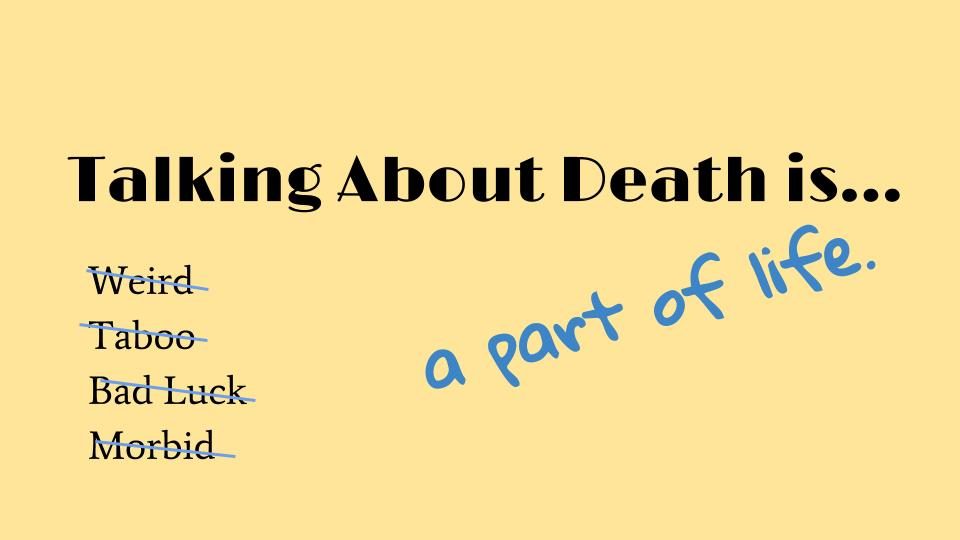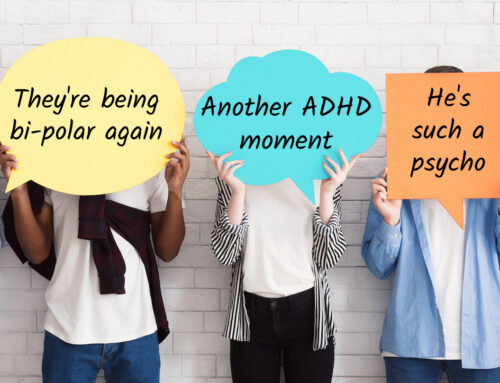Back in the Victorian era, death was spoken about openly. It had to be. With infant mortality rates so high that parents only named their babies after the child’s first birthday and an average lifespan of 47-years-old, death was too all over the place to ignore. As modern medicine advanced, though, a hush fell over conversations about death and dying. In rushed an American obsession with defying illness, extending life, and preserving youth. We became a death-denying culture, one which prefers not to shine too bright a light on the topic.
Over the decades, this habit of ignoring death has caused a prickly situation. For, as many therapeutic approaches tout, we fear things less as we become more familiar with them. Therefore, the more we shoo death into the shadows, the more it becomes a scary monster in the dark. And the scarier death becomes, the greater distance we prefer to keep from it. Behaviorally, this often translates into avoiding conversations with the aging or the ill about their inevitable passing or with the bereaved about their recent loss.
Research overwhelmingly shows, however, it is beneficial to people’s mental health to invite death into the light. Death researcher Caitlin Doughty, in her book From Here to Eternity, tells the story of an American woman who lost her child. The woman wants to wear her hurt on her sleeve, wants to scream and cry, but believes those displays of grief will alarm the friends who drop in on her. On the other side, the friends who come to her side keep the conversation light, hoping not to unhinge her fragile psyche. The chapter reveals that both the grieving person and those who support her engage in a well-intentioned stalemate: neither party addresses death because it doesn’t seem right.
If it seems like speaking more openly about death can ease our fear of it as well as comfort those entering the final phase of their life — a journey we all must take some day — then how can we begin to do it? One way to start is by talking directly to your loved ones about their end of life wishes.
Chatting about death in order to learn about your loved one’s end-of-life wishes is also known as creating an advanced care plan or advanced directive. An advanced care plan is a document of all of a person’s wishes as to how they would like to be cared for at the end — both in the dying process and afterward. It delves into values, wishes, and care options. In the event that they cannot advocate for themselves, it legally directs how their care will be carried out. And, as, currently, only one-third of U.S. adults have an advanced care plan, it’s something that the pandemic has shown us we need to do more of.
This is because, over the past year and a half, many people realized that they were not prepared to answer all of the questions that suddenly crop up when nearing the loss, or after the loss, of a loved one. What kind of burial would they want? Should there be a religious figure present? Who should be told first? How do they want to be remembered? If they are on life support, do they want to be kept there? Have they written a will?
Since it can feel uncomfortable to initiate conversations about end-of-life wishes, there are loads of online resources tailor-made to help you ease into the talk and navigate the emotions that arise as you do. These resources explain end-of-life options and bust some end-of-life myths that might surprise you. Check out the Conversation Project, the Order of the Good Death, and Death Over Dinner.
If there is anyone in your life with whom you want to have an end-of-life chat with, and you feel like you’d benefit from more support than the resources above, reach out for therapeutic support. A therapist can help you navigate the unknown waters and set the stage for a productive conversation about a scary topic. While it might seem ungainly, there is actually much to be won from taking the plunge and having the tough talk — in fact, it’s likely that the person whose wishes you want to learn about is itching to make sure someone knows how they want to be cared for in this last stage of life.
It can help to think of speaking more openly about death as a gift to your loved one. Giving them a space to speak up for their wants and voice their concerns has been found to help ease the fear of death. In part, it gives them a space to seek comfort, as many people avoid talking about their death for fear of making other people uncomfortable. As well, it gives them peace of mind to know that someone who loves them has the means to advocate for them when they themselves no longer can.
It is also a gift to yourself. Conversations like these serve as an emotional buffer to the shock of loss. They ensure that you know what your loved one wants during their passing, so that you can act on their behalf in their time of need. After their passing, it allows you to continue to carry out their wishes in a final act of kindness. This can be very fulfilling. In the end, we want to help one another feel empowered to transition through the stages of life in whatever way authentically speaks to them. We want to help one another feel courage. We want to show how much love and trust we feel toward one another. Death may never not be scary, but we can begin to normalize what is, in reality, the most universal experience of all, and invite our loved ones to share with us.






